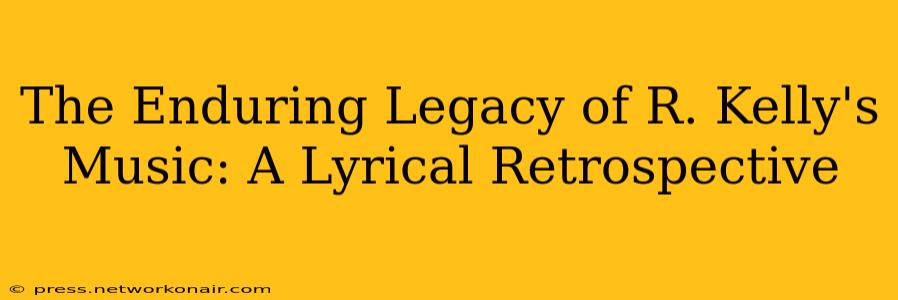R. Kelly's musical legacy is undeniably complex. His undeniable talent as a songwriter and producer, responsible for crafting some of the most iconic R&B hits of the late 20th and early 21st centuries, is inextricably intertwined with the horrific allegations and convictions surrounding his predatory behavior. This creates a difficult, yet crucial, discussion: how do we separate the art from the artist? Can we appreciate the musical genius while acknowledging the immense harm he caused? This retrospective aims to explore the enduring impact of his music while acknowledging the gravity of his crimes.
R. Kelly's Musical Style and Influences: A Deep Dive
R. Kelly's musical style is characterized by its blend of gospel, hip-hop, and traditional R&B, creating a unique sound that resonated deeply with audiences. His use of vocal runs, ad-libs, and falsetto notes became his signature, instantly recognizable and influencing countless artists. Early influences are clearly evident, with the gospel-tinged vocals reminiscent of traditional soul singers, while the rhythmic complexity demonstrates a clear affinity for hip-hop production techniques. He seamlessly integrated these disparate elements, creating a sound both innovative and deeply personal. His mastery of songwriting, particularly his ability to craft emotionally resonant lyrics about love, loss, and desire, further cemented his position as a pivotal figure in modern R&B.
What are R. Kelly's biggest hits?
Some of R. Kelly's biggest hits that cemented his place in music history include:
- "I Believe I Can Fly": This gospel-infused anthem transcended genre boundaries, becoming a global phenomenon and earning numerous awards. Its uplifting message of hope and faith resonated with a wide audience, showcasing Kelly's songwriting prowess at its peak.
- "Bump N' Grind": This sensual track exemplifies his mastery of suggestive lyrics and rhythm, showcasing his ability to create music that was both provocative and undeniably catchy.
- "Ignition (Remix)": This infectious track became a club staple, demonstrating Kelly's knack for crafting songs that were equally appealing to radio listeners and dancefloors. Its memorable hook and relentless beat continue to resonate today.
- "Your Body's Callin'": This song showcases his sophisticated blend of R&B and hip hop, demonstrating his musical versatility and innovative production skills.
These are just a few examples of the many chart-topping hits that showcase Kelly's musical genius. However, the enduring impact of these songs is tainted by the knowledge of his criminal actions.
Did R. Kelly write all his songs?
While R. Kelly is widely credited with writing the majority of his songs, the extent of his solo contributions is debated. It's understood he played a pivotal role in both the musical composition and lyrical content. He frequently collaborated with other songwriters and producers, contributing to the collaborative nature of his hit records. However, his distinct style and lyrical themes remain central to his body of work, making it difficult to completely separate his creative hand from the final product. The exact extent of his individual contributions on each song remains a subject of ongoing discussion and research amongst music scholars.
How did R. Kelly's music influence other artists?
R. Kelly's influence on subsequent generations of R&B and hip-hop artists is undeniable. His unique vocal stylings, rhythmic complexities, and emotionally resonant lyrics have been emulated by countless artists, shaping the soundscape of contemporary music. From his sophisticated production techniques to his innovative use of melody and harmony, his artistic legacy is widespread and deeply embedded in the genre's evolution. Many contemporary R&B artists cite him as a major influence, acknowledging his contributions to the genre's evolution.
The Ethical Dilemma: Separating the Art from the Artist
The enduring popularity of R. Kelly's music presents a complex ethical dilemma. It's a challenge to reconcile the undeniable musical talent with the disturbing allegations and convictions. Many argue that enjoying the music is inherently supporting the artist and his actions. Others believe the art can be appreciated independently from the creator's personal failings. This debate highlights the complicated nature of consuming art produced by individuals who have committed reprehensible acts. Ultimately, the decision rests on the individual, requiring careful consideration of the ethical implications involved.
Conclusion: A Tarnished Legacy
R. Kelly's musical legacy remains a complicated and multifaceted topic. His artistic contributions are undeniable, yet so are the devastating consequences of his actions. The enduring popularity of his music forces a crucial conversation about the separation of art and artist, and the complexities of appreciating talent in the face of profound moral failings. The legacy of his music will continue to be debated and re-evaluated, serving as a reminder of the importance of accountability and the challenging nature of artistic appreciation in the context of moral wrongdoing.

